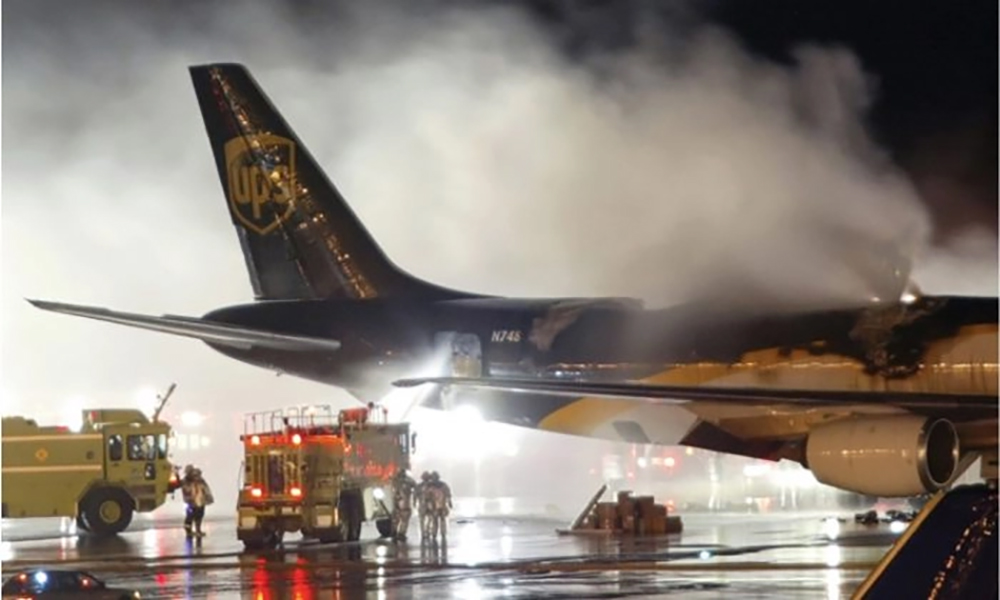|
Getting your Trinity Audio player ready...
|
Federal legislation that seeks to tackle the fire risk posed by lithium batteries is being considered.
By: Naveen Athrappully
Incidents triggered by lithium-ion batteries are now, on average, a weekly occurrence on U.S. flights, according to the U.S. Federal Aviation Administration (FAA), with cabin crews expressing concern over the risk.
This year, 69 lithium battery incidents involving smoke, fire, or extreme heat have occurred on U.S. flights as of Dec. 16, FAA data show.
This equates to more than 1.3 incidents per week. Since 2015, the number of such events has increased by more than 330 percent.
Between March 3, 2006, and Nov. 5, 2024, a total of 579 lithium battery incidents were recorded, with the majority of cases coming from passenger carriers.
Battery packs and batteries accounted for the bulk of these incidents, with 229 events, followed by e-cigarettes/vape devices with 122, cell phones with 81, laptops with 70, and the rest involving other electronic and medical devices.
On Nov. 5, a smoke detector alarm from the lavatory of a United Airlines flight coming from San Francisco went off.
“Flight attendants found a passenger in the lavatory who stated their laptop began to overheat. A flight attendant placed the laptop in a thermal containment bag, and the aircraft continued to its destination without further incident,” the FAA said.
Earlier on Oct. 5, a passenger carry-on bag caught fire during the boarding process in Buffalo, New York, with lithium batteries being the culprit. Passengers were removed from the aircraft, while the fire was extinguished and batteries were taken out of the plane.
A survey report released by the nonprofit UL Standards & Engagement said cabin crew concerns about these risks of lithium batteries are “pronounced, with 87% expressing that they are very or somewhat concerned about lithium-ion battery incidents occurring on an aircraft.”
While almost all cabin crew members, 97 percent, reported they were aware of such risks, in contrast, “only 65% of airline passengers from ULSE’s consumer-focused surveys say they are aware” of them.
“Although very unlikely, thermal runaway incidents onboard happen around twice a week and are at the highest point we’ve seen,” said David Wroth, director of the Thermal Runaway Incident Program at UL Standards & Engagement. “Airlines are playing an active role in working to mitigate the risk of these incidents. Most importantly, airlines are equipping their crew with the knowledge needed to handle a potential lithium-ion battery incident.”
Lithium Fire Dangers, Legislation
Fires triggered by lithium batteries are a major concern among experts. During testimony to Congress earlier this year, Chief Fire Marshall of the New York City Fire Department Daniel Flynn warned that lithium battery fires are “more intense and more dangerous” than other sources.
“They undergo a series of explosions, releasing highly toxic gasses and projecting flaming cells that can travel great distances, increasing the likelihood that the fire will spread,” he said. “These fires instantly create severely dangerous conditions, rendering escape for anyone nearby significantly challenging. This is especially true if a fire occurs at night when an occupant is sleeping.”
Large volumes of water are required to suppress lithium fires, making it “extremely difficult” to be extinguished. Last year, New York City reported 268 fires triggered by lithium batteries, which injured 150 people and killed 18. Many of these batteries were being used in e-bikes.
In March last year, Rep. Ritchie Torres (D-N.Y.) introduced the HR 1797 “Setting Consumer Standards for Lithium-Ion Batteries Act,” which aims to tackle the issue of lithium fires.
The bill requires the U.S. Consumer Product Safety Commission to set up a safety standard for rechargeable lithium-ion batteries used in micro-mobility devices such as electric bikes. Companies such as Uber and DoorDash have lent support to the bill.
Robert S. Tucker, commissioner of the New York City Fire Department, is also backing the bill. In a Dec. 18 statement, the department said that Congress was moving closer to passing the measure.
“We know the problems we see here are occurring all over the country. This legislation will finally allow everyone to be on the same page when it comes to the safe use of these devices,” Tucker said. “This federal legislation is the critical piece that was missing in our fight against this problem. We are elated to hear that there will be a law signed soon.”





